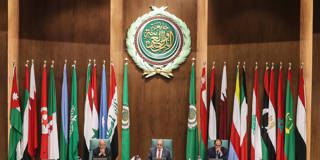The COVID-19 pandemic threatens every region in the world, none more so than the Middle East. With oil prices plummeting and public-health costs poised to skyrocket, the Arab world must use this tragic occasion to forge a new cooperative regional order.
OXFORD – The COVID-19 pandemic has triggered a public-health emergency and a steep reduction in oil prices, which represents a perfect storm for the Middle East, where everything from salaries to subsidies are dependent on oil revenues. As in the past, the oil-price shock will inevitably spill over to non-oil-producing countries through reductions in official aid transfers and lower worker remittances, further eroding the fiscal cushions needed to cope with COVID-19.

OXFORD – The COVID-19 pandemic has triggered a public-health emergency and a steep reduction in oil prices, which represents a perfect storm for the Middle East, where everything from salaries to subsidies are dependent on oil revenues. As in the past, the oil-price shock will inevitably spill over to non-oil-producing countries through reductions in official aid transfers and lower worker remittances, further eroding the fiscal cushions needed to cope with COVID-19.